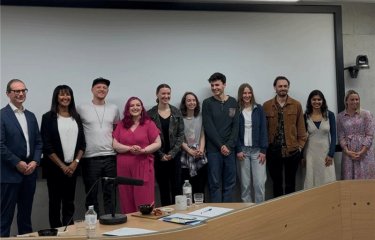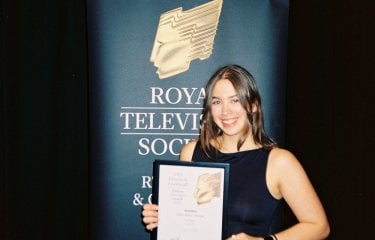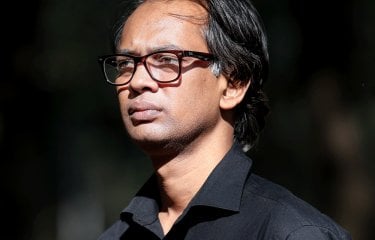What it takes to be a filmmaker | Mark Jenkin
01 February 2023
Mark Jenkin’s latest film ENYS MEN has received glowing reviews from film critics. So, what does the award-winning director think it takes to be a successful filmmaker?
As Distinguished Professor of Film Practice at Falmouth University, Mark supports students across our School of Film & Television courses.
In this interview, BAFTA award-winning director Mark Jenkin talks to Film & Television MA (Online) Course Leader, Jem Mackay on what it takes to be a successful filmmaker.
The advice I would give any filmmaker, and this is through my personal experience, is to find out what is it you love doing - because this should be fun, making films.
That's not to say it shouldn't be difficult, or it shouldn't be challenging, to you and the people you're working with. But it needs to be fun. And I don't mean you're always having an amazing time and laughing and everything. But fun as in you've got to be energised by it, you've got to be excited about it. You've got to go to bed on Sunday night excited about getting up on Monday morning to start work. Because filmmaking is really difficult. It's not a life or death occupation, but it's tough and it takes a long time, and that makes demands on you physically, mentally, emotionally.
Unless you're at 100% when you start the process, you won't get to the end of it, I don't think. Because it will take so much out of you, you've got to be in absolute prime condition at the beginning and a lot of that is being enthusiastic. Because things will go wrong.
You'll have logistical problems, you'll have financial problems, you'll have a deadline that suddenly becomes a problem, you'll have equipment failure, you'll have collaborator failure, you'll have weather failure, you'll have personal failure. All of these things will happen. You don't know which ones will happen, but a cocktail of those things will go wrong during the shoot.
In order to get through all of that, you need to be absolutely focused and driven at that first moment when you start. And so people often think that I'm going to say, "you should be shooting film, pick up a film camera". You know, because film cameras are the best cameras to shoot on, film stock is the best medium to use, processing your own footage is the best way to make a film, not recording location dialogue is the best way to work, doing your own music at the end of it - that's all the best way to make a film, but only for me. And that's the thing that makes me excited on a Sunday night to get up on Monday morning.
Other people have to find out what theirs is. If that's shooting with a huge team and being a conventional director and working with a Director of Photography, and you don't go anywhere near the camera and you don't have anything to do with the sound department or production design, you’re solely a director - if that's what really fires you up, that's what you should be doing.
You shouldn't be fitting yourself in to somebody else's plan. If the way you want to make films is on an iPhone and you never collaborate with anybody and that's the thing that excites you, then that's what you should do.




